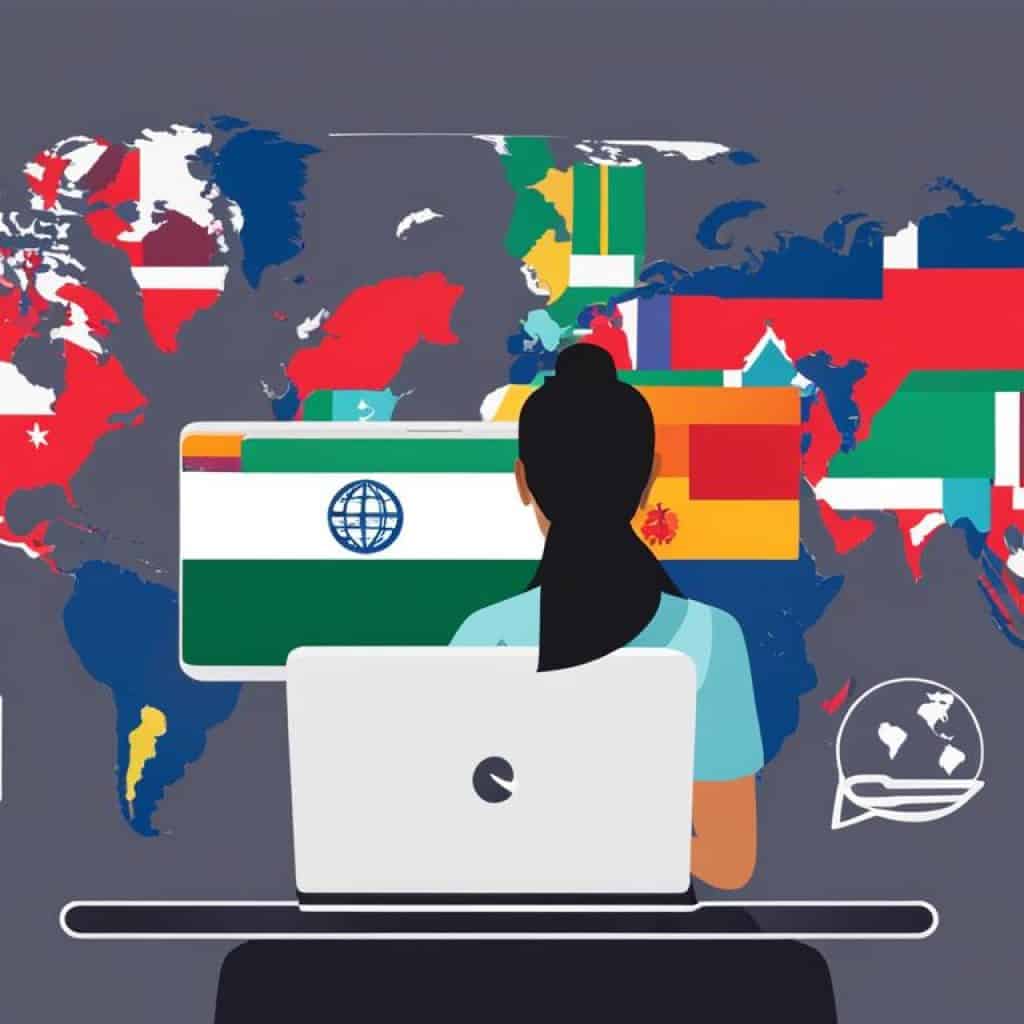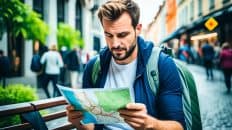Using a VPN is essential for travelers who want to ensure their privacy and security while accessing the internet on the go. When traveling, you often rely on public Wi-Fi networks, which can put your personal data at risk. By using a VPN, you can create a secure connection that encrypts your data and protects it from potential threats.
Key Takeaways:
- VPN is crucial for travelers to maintain privacy and security when using public Wi-Fi networks.
- A VPN creates a private network from a public internet connection, making your online actions untraceable.
- By encrypting your data, a VPN prevents unauthorized access to your private information.
- Choose a reputable VPN service that offers device compatibility, server network coverage, and strong customer support.
- Using a VPN abroad allows you to bypass geo-restrictions and access blocked content.
Why You Need a VPN When Traveling
When traveling, connecting to public Wi-Fi networks puts your data at risk. Hackers can easily intercept unencrypted data, such as passwords and credit card information, on these networks. A VPN provides enhanced security by encrypting your data and creating a secure connection between your device and the internet. It also allows you to access geo-restricted content and ensures your internet privacy while abroad.
Stay Safe and Secure
Using a VPN when traveling provides several key benefits for travelers:
- Secure Internet Connection: A VPN encrypts your data, protecting it from potential hackers and cyber threats while connected to public Wi-Fi networks.
- Access to Geo-Restricted Content: By connecting to a VPN server in a different location, you can bypass regional restrictions and access content that may be blocked in the country you’re visiting.
- Internet Privacy: With a virtual private network, your online activity remains private and anonymous, ensuring that your personal information and browsing habits are kept confidential.
Whether you’re browsing the web, streaming movies, or conducting online banking, a VPN offers peace of mind and a secure online experience while traveling.
“A VPN is a must-have for travelers seeking a secure and private internet connection. It encrypts your data, allowing you to safely access the web and protect your personal information from potential threats.”
â Traveler and cybersecurity expert, Jane Smith
By using a VPN while traveling, you can enjoy the benefits of a secure internet connection, access to restricted content, and peace of mind knowing that your data is protected. Keep reading to learn how a VPN works and how to choose the right service for your travel needs.
How a VPN Works
A Virtual Private Network (VPN) works by creating a secure and encrypted connection between your device and the internet. It provides an extra layer of privacy and security, ensuring that your online activities remain protected from prying eyes.
When you connect to a VPN, it establishes a virtual tunnel between your device and a VPN server. This tunnel encrypts your data using strong encryption algorithms, making it unreadable to anyone who might intercept it.
The encrypted data is then routed through the VPN server before reaching its final destination. This process ensures that your online activity remains private and secure, as your real IP address is hidden and replaced with the IP address of the VPN server.
VPN Encryption
VPN encryption plays a crucial role in securing your data. It uses complex mathematical algorithms to encode your information, making it virtually impossible to decipher without the corresponding decryption key.
With VPN encryption, your data is transformed into a series of random characters, also known as ciphertext. Only the intended recipient with the correct key can decrypt the ciphertext and convert it back into its original form.
“VPN encryption makes your data as secure as a secret code that only you and the VPN server can understand.”
VPN Server
The VPN server is a key component of how a VPN works. It acts as an intermediary between your device and the internet, handling all data transmission and encryption processes.
When you connect to a VPN server, your data is first encrypted, then sent through the server to its destination. This not only masks your real IP address but also allows you to bypass geo-restrictions and access content that may be blocked in your location.
VPN servers are strategically located in different countries worldwide, giving you the flexibility to choose a server location that suits your needs. By connecting to a server in a specific country, you can appear as if you are accessing the internet from that location, enabling you to access region-restricted content.
Choosing the Right VPN Service
When it comes to selecting a VPN service for your travels, there are several important factors to consider. Ensuring that your chosen VPN meets your specific needs will help you enjoy a secure and seamless internet experience while on the go. Here are some key tips to help you pick the best VPN for travel:
Device Compatibility
Make sure the VPN service you choose is compatible with the devices you use most frequently. Whether you use a laptop, smartphone, or tablet, check that the VPN provider supports your preferred operating systems.
Server Network Coverage
Opt for a VPN service with an extensive network of servers in various countries. This will allow you to connect to servers in the locations you plan to visit, ensuring a fast and reliable connection.
Speed and Performance
Look for a VPN service that offers high-speed connections and minimal performance impact. A VPN with fast speeds will allow you to stream content, download files, and browse the internet without experiencing frustrating delays.
No Restrictions on Simultaneous Connections
If you travel with multiple devices or often share your VPN account with others, choose a provider that allows for multiple simultaneous connections. This way, you can protect all your devices without needing to purchase additional subscriptions.
User-Friendly Installation and Usage
Consider a VPN service that offers an easy installation process and user-friendly interface. This will make it simple for you to set up and use the VPN, even if you are not tech-savvy.
Server Endpoints in Countries You Plan to Visit
Prioritize a VPN service with server endpoints in the countries you plan to travel to. Having access to servers in your desired locations will enable you to bypass regional restrictions and access geo-blocked content with ease.
Strong Customer Support
Ensure the VPN service you choose provides reliable and responsive customer support. In case you encounter any issues while traveling, having access to helpful customer support can make a significant difference in resolving problems quickly.
Some popular VPN services that meet these criteria include ExpressVPN and NordVPN. These providers offer a range of features suitable for travelers and enjoy a strong reputation in the industry.

| VPN Service | Device Compatibility | Server Network Coverage | Speed and Performance | Simultaneous Connections | User-Friendly | Server Endpoints | Customer Support |
|---|---|---|---|---|---|---|---|
| ExpressVPN | Windows, macOS, iOS, Android, Linux | 3000+ servers in 160 locations across 94 countries | Excellent speeds and performance | Up to 5 devices | User-friendly apps and intuitive interface | Extensive server network with global coverage | 24/7 live chat support |
| NordVPN | Windows, macOS, iOS, Android, Linux | 5500+ servers in 59 countries | Fast and stable connections | Up to 6 devices | Intuitive and easy-to-use apps | Servers in popular travel destinations | 24/7 live chat support |
Benefits of Using a VPN When Traveling
Using a VPN when traveling offers various benefits. It ensures your privacy and security while using public Wi-Fi networks, protects your data from potential hackers and cyber threats, allows you to bypass geo-restrictions and access blocked content, and provides a secure connection when conducting online banking or shopping. A VPN is an essential tool for maintaining internet privacy for travelers.
When connecting to public Wi-Fi networks abroad, the risk of data interception is high. Hackers can easily access unencrypted data, such as passwords and credit card information, on these networks. By using a VPN, your data is encrypted and your online actions become untraceable, ensuring your staying safe on public Wi-Fi abroad.
A VPN also protects your sensitive information from potential hackers and cyber threats. As your data is encrypted, it becomes unreadable to anyone trying to intercept it. This adds an extra layer of security, keeping your data and personal information secure while traveling.
Geo-restrictions can limit your access to certain websites and services while traveling. However, with a VPN, you can bypass these restrictions by connecting to a server in a different country. This enables you to access blocked content, including streaming services and websites, allowing you to enjoy your favorite shows and stay connected while abroad.
Furthermore, when conducting online banking or shopping while traveling, it’s crucial to have a secure connection. A VPN provides that security, encrypting your data and ensuring that your sensitive information remains private and protected from potential threats.
In summary, using a VPN when traveling offers a range of benefits, including internet privacy, security on public Wi-Fi networks, access to blocked content, and a secure connection for online activities. It’s an indispensable tool for travelers who want to stay safe and protect their digital information while on the move.
How to Set Up a VPN for Travel
Setting up a VPN for travel is a simple process that ensures your internet connection remains secure and private while you’re on the go. Follow these steps to get started:
- Choose a reputable VPN service: Look for a VPN provider that offers strong encryption, a wide range of server locations, reliable customer support, and user-friendly apps for your device.
- Sign up for an account: Once you’ve selected a VPN service, sign up for an account on their website. Provide the necessary information and choose a subscription plan that suits your needs.
- Download and install the VPN app: After signing up, download the VPN app for your device. Most VPN providers offer apps for multiple platforms, including Windows, macOS, iOS, and Android. Install the app on your device following the provided instructions.
- Launch the app and log in: Open the VPN app and log in using the account credentials you created during the sign-up process.
- Choose a server location: Once you’re logged in, you’ll typically have the option to select a server location. Choose a server that is nearby or in the country you’re visiting to minimize latency and maximize connection speed.
- Connect to the VPN server: Click the connect button or tap the on/off switch to establish a connection to the VPN server. Once connected, all your internet traffic will be encrypted and routed through the virtual network, ensuring your data remains secure and private.
That’s it! You have successfully set up a VPN for travel. Remember to keep the VPN app running in the background whenever you’re connected to the internet to enjoy a safe and secure browsing experience.
Setting up a VPN for travel is a crucial step in protecting your sensitive data and maintaining your online privacy while away from home. By following these simple instructions, you can enjoy a worry-free internet experience wherever you go.
Using a VPN Abroad
When traveling abroad, accessing geo-restricted content can be a challenge. However, with the use of a VPN (Virtual Private Network), you can easily bypass regional restrictions and gain access to websites, streaming services, and social media platforms that are blocked in the country you’re visiting.
By connecting to a server location in the desired country, a VPN allows you to browse the internet as if you were physically present in that location. This gives you the freedom to enjoy your favorite content and stay connected with friends and family, regardless of your physical location.
Whether you want to stream your favorite movies and TV shows, access local news websites, or use social media platforms that are not available in certain countries, a VPN makes it possible. It provides a secure and encrypted connection that masks your IP address and makes it appear as if you are accessing the internet from a different location.
Not only does a VPN grant you access to geo-restricted content, but it also enhances your online privacy and security while traveling. It encrypts your internet traffic, preventing hackers and cybercriminals from intercepting your sensitive information and personal data.
“A VPN allows you to browse the internet freely and securely, no matter where you are in the world.”
Using a VPN abroad ensures that your online activities remain anonymous and protects your digital identity from potential threats. Whether you’re browsing the web, making online purchases, or accessing your banking accounts, a VPN provides an added layer of security.
With the increasing popularity of streaming platforms, accessing international content is a common desire for travelers. A VPN not only unlocks access to geo-restricted streaming services but also allows you to enjoy your favorite shows and movies in your preferred language and with localized content.
It’s important to note that while a VPN is a powerful tool for accessing geo-restricted content abroad, it’s essential to choose a reputable VPN service provider. Look for providers that offer strong encryption protocols, a wide network of servers across different countries, and reliable customer support.
By using a VPN abroad, you can fully enjoy your international travel experience while staying connected to the internet securely and accessing the content you love.
Additional Security Measures While Traveling
While using a VPN is crucial for protecting your online security while traveling, there are other important measures you should also take to ensure a safe and secure experience. By following a cyber hygiene checklist, you can further safeguard your personal information and data from potential threats.
Maintain Updated Software and Devices
Keeping your software and devices up to date is essential in minimizing vulnerabilities and protecting against potential cyber-attacks. Regularly install the latest updates and patches for your operating system, antivirus software, and other applications to benefit from the latest security enhancements.
Use Strong and Unique Passwords
Creating strong and unique passwords for your online accounts adds an extra layer of protection. Use a combination of uppercase and lowercase letters, numbers, and special characters. Avoid using easily guessable passwords or reusing the same password across multiple accounts. Consider using a password manager to securely store and generate strong passwords.
Avoid Public Wi-Fi Networks
Public Wi-Fi networks often lack proper security measures, making them a prime target for hackers. Avoid connecting to public Wi-Fi networks when accessing sensitive information, such as online banking or making financial transactions. Instead, use your mobile data or a personal hotspot, or choose a VPN with a secure connection for additional protection.
Regularly Backup Your Data
Backing up your data regularly helps protect against data loss and potential ransomware attacks. Create backups of important files and documents on external hard drives, cloud storage platforms, or other secure backup solutions. In case of a lost or stolen device, having a backup ensures that you can still access your important information.
Enable Two-Factor Authentication
Enabling two-factor authentication (2FA) adds an extra layer of security to your online accounts. With 2FA, you’ll need to provide a second form of verification, such as a code sent to your mobile device, in addition to your password. This helps prevent unauthorized access even if your password is compromised.
“Following good cyber hygiene practices ensures that your personal information and data remain secure while traveling.”
By implementing these additional security measures, in combination with using a VPN, you can greatly enhance your online security while traveling. Protecting your personal information, data, and privacy should always be a top priority to ensure a safe and secure online experience.
Cyber Hygiene Checklist
| Security Measure | Description |
|---|---|
| Maintain Updated Software and Devices | Regularly update your operating system, antivirus software, and other applications to stay protected against potential vulnerabilities. |
| Use Strong and Unique Passwords | Create strong and unique passwords for your accounts to prevent unauthorized access. |
| Avoid Public Wi-Fi Networks | Avoid connecting to unsecured public Wi-Fi networks to protect your data from potential hackers. |
| Regularly Backup Your Data | Create backups of important files and documents to ensure they are not lost in the event of theft or device failure. |
| Enable Two-Factor Authentication | Add an extra layer of security to your online accounts by enabling two-factor authentication. |

Best VPN Services for Travel
When it comes to choosing a VPN service for travel, you want to ensure you have the best protection and performance while on the go. Here are some of the top VPN providers that offer excellent features and reliability:
- ExpressVPN: Known for its fast speeds and strong encryption, ExpressVPN is a popular choice for travelers. With a large server network across multiple countries, it allows you to access geo-restricted content and browse the internet with added privacy.
- NordVPN: NordVPN offers high-level security features like double encryption and a strict no-logs policy. It also provides a user-friendly interface, making it easy to connect and protect your devices while traveling.
- TunnelBear: TunnelBear is an excellent VPN option for beginners. It offers a simple and intuitive interface, along with strong encryption and a wide range of server locations. TunnelBear also has a free plan available, making it a great choice for budget-conscious travelers.
When selecting the best VPN service for your travel needs, consider factors such as server coverage, connection speeds, security features, and ease of use. Compare these providers based on your specific requirements and choose the one that offers the best balance of performance, security, and user experience.
Table: Comparison of Best VPN Services for Travel
| VPN Service | Server Network | Connection Speeds | Security Features | User-Friendly |
|---|---|---|---|---|
| ExpressVPN | Wide coverage | Fast | Strong encryption | Yes |
| NordVPN | Extensive network | High speeds | Double encryption, no-logs policy | Yes |
| TunnelBear | Multiple server locations | Good speeds | Secure encryption | Yes |
Quote:
“Using a reliable VPN service is crucial for travelers who want to protect their online privacy and access content from around the world securely.”
Before your next trip, make sure to choose one of these top VPN services to ensure your online activities remain private and secure while traveling.
Using Your VPN Effectively
To maximize the benefits of your VPN and ensure a secure online experience, follow these essential tips:
- Connect to your VPN whenever using public Wi-Fi networks or accessing sensitive information online. By encrypting your data, a VPN safeguards your personal information from potential threats.
- Choose nearby server locations for better speeds and a more efficient network connection. This ensures smooth browsing, streaming, and downloading while maintaining a secure connection.
- Regularly check the status of your VPN to ensure it remains active and connected. A stable and reliable VPN connection is crucial for uninterrupted privacy and security.
- Remember that while a VPN provides security and privacy, it does not guarantee full anonymity. Adhere to best practices such as avoiding suspicious websites, using strong passwords, and updating your software regularly.
By following these VPN tips, you can maximize the benefits of your VPN service and enjoy a safer and more secure online experience while traveling.
Conclusion
Using a VPN when traveling is crucial for safeguarding your privacy, ensuring online security, and enjoying unrestricted access to the internet. By encrypting your data and creating a secure connection, a VPN protects your sensitive information from potential threats when using public Wi-Fi networks. It also allows you to bypass geo-restrictions and access region-blocked content, providing a seamless online experience while abroad.
When selecting a VPN service, opt for a reputable provider that offers reliable encryption, a wide network of servers, and user-friendly apps for various devices. Follow best security practices such as keeping your software updated, using strong and unique passwords, and avoiding unsecured Wi-Fi networks. By combining these measures, you can enjoy a safer and more secure online experience while traveling.

Final Thoughts on Using VPN When Traveling
âA VPN ensures your online privacy, giving you peace of mind and protection from potential threats. Whether you’re accessing your bank accounts, sending sensitive information, or browsing the web, a VPN provides an added layer of security.â
- Protect your data from potential threats when using public Wi-Fi networks.
- Bypass location-based restrictions and access geo-blocked content.
- Create a secure connection and safeguard your privacy while traveling.
- Choose a reputable VPN service with strong encryption and a wide server network.
- Follow best security practices to further enhance your online protection.
(Meta title)
When traveling, it’s crucial to use a Virtual Private Network (VPN) to ensure secure internet connections, gain access to restricted content, and protect your privacy. A VPN creates a private network from a public internet connection, encrypting your data and making it inaccessible to potential threats. Here’s a step-by-step guide on how to use a VPN while traveling:
- Choose a Reliable VPN Service: Start by selecting a reputable VPN service that suits your needs. Popular options include ExpressVPN and NordVPN.
- Sign Up and Install: Create an account with your chosen VPN service and follow the installation instructions to set up the VPN app on your device.
- Select a Server Location: Launch the VPN app and choose a server location from the available options. Consider selecting a location close to your current whereabouts for better performance.
- Connect to the VPN: Once you’ve chosen a server location, click the “Connect” button to establish a secure connection with the VPN server.
- Enjoy Secure Browsing: With the VPN connected, your internet traffic will be encrypted, ensuring secure browsing, access to restricted content, and protection against potential threats.
By following these steps, you can use a VPN effectively when traveling, safeguarding your online activities and enjoying a more secure internet experience.
“Using a VPN while traveling provides peace of mind knowing that your data is protected and your online activities remain private, no matter where you are in the world.”
So, whether you’re connecting to public Wi-Fi networks at hotels, airports, or cafes, or simply want to access geo-restricted content, using a VPN is the key to a safer and more unrestricted internet experience while traveling.
(Meta description)
Discover secure Internet connections with our guide on how to use VPN when traveling, ensuring access to restricted content and privacy abroad. By utilizing a VPN (Virtual Private Network) while on the go, you can protect your sensitive data from potential cyber threats and experience a safer online browsing experience during your travels.
When you connect to public Wi-Fi networks, such as those available in hotels, coffee shops, or airports, your personal information becomes more vulnerable to hackers. A VPN creates a secure and encrypted tunnel between your device and the internet, preventing unauthorized access to your data and making your online activities untraceable.
Here’s how a VPN works: When you connect to a VPN server, all of your internet traffic is routed through that server, encrypting your data and hiding your IP address. This ensures that your online activity remains private and secure, even on public networks. It also allows you to bypass geo-restrictions and access content that may be blocked in the country you’re visiting.
Benefits of Using a VPN When Traveling
Using a VPN offers several benefits for travelers:
- Enhanced security: Your data is encrypted, protecting it from potential hackers and cyber threats.
- Privacy protection: A VPN ensures your online activities remain private and untraceable.
- Access to restricted content: Bypass geo-restrictions and access websites, streaming services, and social media platforms that may be blocked in certain countries.
- Safe online banking and shopping: A VPN provides a secure connection, allowing you to conduct financial transactions without worrying about your personal information being compromised.
To use a VPN effectively while traveling, you need to choose the right VPN service. Consider factors such as device compatibility, server network coverage, speed and performance, and user-friendly installation and usage. Popular VPN services for travel include ExpressVPN, NordVPN, and TunnelBear.
Once you have selected a VPN service, setting up a VPN for travel is straightforward. Simply sign up for an account, download and install the VPN app on your device, and choose a server location. Once connected, all of your internet traffic will be encrypted and routed through the VPN server.
Maximizing the Benefits of a VPN
To maximize the benefits of using a VPN while traveling, follow these best practices:
- Always connect to your VPN when using public Wi-Fi networks to ensure your data remains secure.
- Choose nearby server locations for better speeds.
- Regularly check your VPN’s status to ensure it is active and protecting your online activities.
- Remember that a VPN provides security and privacy, but it does not guarantee complete anonymity. Follow good cyber hygiene practices and use your VPN in conjunction with other security measures.
Using a VPN when traveling is essential for maintaining privacy, security, and unrestricted access to the internet. Choose a reputable VPN service, follow best practices, and enjoy a safer and more secure online experience while exploring new destinations.
Conclusion
In conclusion, using a VPN when traveling is crucial to ensure privacy, security, and unrestricted access to the internet. Whether you’re connecting to public Wi-Fi networks or accessing geo-restricted content, a VPN provides the necessary protection to safeguard your data and online activities.
By encrypting your data and creating a secure connection, a VPN shields your information from potential threats and hackers lurking on public networks. It also allows you to bypass regional restrictions, enabling you to access websites, streaming services, and social media platforms while abroad.
When choosing a VPN service, opt for a reputable provider that offers features such as strong encryption, a wide server network, and user-friendly apps. Additionally, following security best practices, such as keeping your devices updated and using strong passwords, further enhances your online protection.
FAQ
How do I use a VPN when traveling?
To use a VPN when traveling, first, select a reputable VPN service and sign up for an account. Then, download and install the VPN app on your device. Launch the app, choose a server location, and connect to the VPN server. Your internet traffic will now be encrypted and routed through the VPN, ensuring a secure connection.
Why do I need a VPN when traveling?
A VPN is essential for travelers as it provides privacy and security when accessing the internet. Using public Wi-Fi networks puts your data at risk, but a VPN encrypts your data and creates a secure connection, protecting it from potential hackers. Additionally, a VPN allows you to bypass geo-restrictions and access blocked content while abroad.
How does a VPN work?
A VPN works by creating a virtual tunnel between your device and the internet. It encrypts your data using strong encryption algorithms, making it unreadable to anyone who intercepts it. When you connect to a VPN server, your data is routed through that server before reaching its destination, ensuring that your online activity remains private and secure.
How do I choose the right VPN service for travel?
When selecting a VPN service for travel, consider factors like device compatibility, server network coverage, speed and performance, simultaneous connection restrictions, acceptable speeds, user-friendly installation and usage, and strong customer support. It’s also important to choose a VPN service with endpoints in countries you plan to visit.
What are the benefits of using a VPN when traveling?
Using a VPN when traveling offers several benefits. It ensures your privacy and security while using public Wi-Fi networks, protects your data from potential hackers and cyber threats, allows you to bypass geo-restrictions and access blocked content, and provides a secure connection for online banking or shopping.
How do I set up a VPN for travel?
To set up a VPN for travel, choose a reputable VPN service and sign up for an account. Download and install the VPN app on your device. Launch the app, choose a server location, and connect to the VPN server. Your internet traffic will then be encrypted and routed through the VPN, ensuring a secure connection.
How can I use a VPN abroad?
When using a VPN abroad, you can access geo-restricted content by connecting to a server location in the desired country. This allows you to bypass regional restrictions and access websites, streaming services, and social media platforms that may be blocked in the country you’re visiting. A VPN gives you the freedom to browse the internet as if you were in a different location.
What other security measures should I take while traveling?
In addition to using a VPN, there are other security measures you should take while traveling. Keep your software and devices up to date, use strong and unique passwords, avoid connecting to public Wi-Fi networks, backup your data, and enable two-factor authentication for added security. Following good cyber hygiene practices ensures that your personal information and data remain secure while traveling.
What are the best VPN services for travel?
Some of the best VPN services for travel include ExpressVPN, NordVPN, and TunnelBear. These services offer reliable encryption, a wide server network, good speeds, and easy-to-use apps for different devices. They also provide additional security features such as kill switches and no-logs policies. Consider your specific needs and compare features to choose the best VPN service for your travel requirements.
How can I use my VPN effectively?
To use your VPN effectively while traveling, always connect to it when using public Wi-Fi networks or accessing sensitive information online. Use nearby server locations for better speeds and ensure that your VPN stays active by checking its status regularly. Keep in mind that a VPN provides security and privacy but does not guarantee full anonymity. Follow best practices and use your VPN in conjunction with other security measures for comprehensive online protection.


















Add comment